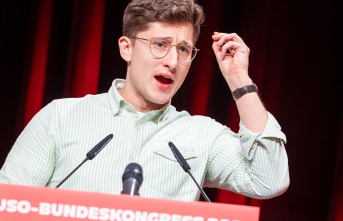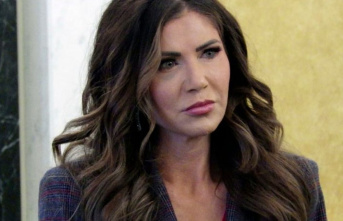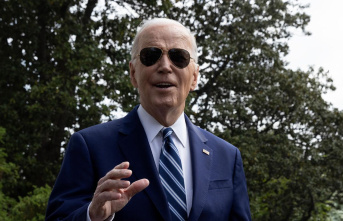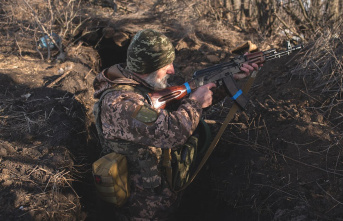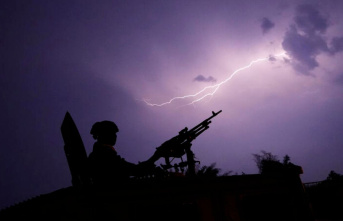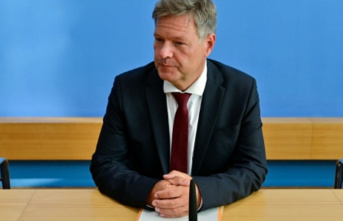While opposition leader Friedrich Merz is still complaining at the lectern in the Bundestag about the "madness" of the traffic light coalition, Olaf Scholz is leafing through his manuscript again on the government bench - what you do when it's your turn next: take a quick look again whether everything fits. Scholz is done with it quickly. He has probably already decided by this point that he will not need the text.
When he goes over to the desk a few minutes later, he takes the few pages that were written down for him. But only at the very beginning does he look at it two or three times. "Dear colleague Merz, I just listened to you very carefully," he says at the beginning. "I want to answer you one thing: Don't underestimate our country, don't underestimate the citizens of this country. In difficult times, our country surpasses itself, we have a good tradition of linking up when things get difficult." That's about as far as it went in his text.
Scholz with a clenched fist and raised index finger
But what then follows is an Olaf Scholz, the likes of which have not yet been seen in his nine months as chancellor, at least in the Bundestag: aggressive, emotional, almost angry. He is holding the desk with his left hand. He repeatedly clenches his right fist, from which he sometimes sticks his index finger towards Friedrich Merz, who sits half-right in the front row of the CDU/CSU parliamentary group.
"They just talk about the topic and the problems of this country. And that's really a very, very big problem," says Scholz to Merz. "And if others solve the problems that you haven't even recognized, then talk around them too."
Chancellor lets out air
So the chancellor can also attack. In the Bundestag, he had already hinted at this before, for example when it came to compulsory vaccination at the very beginning of his term in office. But he's never been so outspoken in Parliament. Scholz has only made such an appearance once, on May 1 in Düsseldorf at a DGB rally, at which he was whistled a few weeks after the Russian war of aggression against Ukraine began.
But this time the audience is different - and so is the situation. Scholz has had a difficult few weeks, during which the pressure to do something about the drastic price increases has continued to grow. In which he was repeatedly accused of procrastination and hesitation. On Sunday he put together a 65 billion package to relieve people in Germany with his traffic light. And now he looks like he just wants to let some air out.
Merz: "hodgepodge of compromises"
The expected attacks from Merz at the start of the general debate are only convenient for him. The CDU leader accuses Scholz:
- to prolong the Russian war of aggression in Ukraine with its hesitation in supplying arms.
- not having a compass in the economic crisis. The government's decisions to support citizens are a "hodgepodge of compromises at the level of the lowest common denominator".
- to follow up the announcement of the 100 billion program for the Bundeswehr with too few actions. "We cannot trust the promises you have made."
- possibly irrevocably damaging Germany as a business location by saying no to the continued operation of the three remaining nuclear power plants.
Scholz gives the opposition politician
Merz does what an opposition leader does in a general debate: attack the government. The curious thing about this debate is that Scholz, too, at times adopts the mode of an opposition politician in his speech and spends some time attacking the former government led by CDU Chancellor Angela Merkel.
While CDU-led ministries did not find it problematic that the gas storage facilities were empty last year, the traffic light made sure that that changed, he says, for example. Decisions have now been implemented "at a pace that no CDU-led government in this country has ever been able to do." He blames the omissions in the expansion of renewable energies with the exclamation "That was you!" to thunderous applause from his own Union people, pointing to Merz.
What Scholz does not say: he was part of this government himself. As finance minister and vice chancellor, i.e. as Merkel’s deputy. The members of the Bundestag are thus witnessing a head of government who opposes a previous government of which he himself was a member.
Scholz' crisis promise: "We'll probably get through it"
With his attacks on the opposition, Scholz achieved one thing that day: that the noise in the coalition about the operating times of the remaining nuclear power plants receded into the background. Incidentally, there is not much going on in the debate in terms of content: no new announcements from the government, no new ideas from the opposition. But perhaps that's not what a general debate is for.
However, Scholz reiterates his two crisis promises to the population: "You'll never walk alone" - nobody is left alone, especially financially. And: "We'll probably get through this winter, despite all the tension." It means the power supply. Scholz will be measured against these two announcements. His criticism of the opposition, on the other hand, should no longer be an issue tomorrow.


